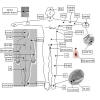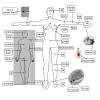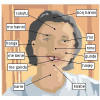|
Lesson
10. Boro gahamo |
|
Content
-
Intro
-
Vocabulary
-
Greetings
-
Grammar
-
Exercises
|
|
|
10.A.
Intro
Boro gahamo
Explore the human body and learn the
Zarma words for most parts of the body and
many organs.
To enlarge a drawing, move the pointer to the drawing of interest
and click the left mouse button.
Read the text below the picture. Each
picture has a mirror image that enables you
to practice your Zarma knowledge. By
clicking on the last line text below the
picture you can easily switch between these
two.
Some Zarma words may be used for
different body parts. For example "ce"
is used for "leg" but also for the different
parts of the leg, "thigh", "shin" and
"foot". For some body parts there are
synonyms, e.g. both "jesse" and "jase" mean "shoulder" and "upper arm".
|

a male body
|

|

a female body
|
|

a male body inside
|

|

a female body inside
|
|
|
10.B.
Vocabulary
-
Verbs
-
Nouns
-
Adverbs,
prepositions, conjunctions, etc.

Learn these words by heart.
Extra
Move the mouse to one of the underlined words and a sentence in which the word is used will appear. Click the left mouse button and a photo will appear in a popup.
When you move the pointer on the screen with your mouse over the photo the translation of the Zarma sentence will show.
|
|
10.B.1
Verbs
|
Zarma |
English |
Pronunciation |
|
hina |
to
cook |
hi / na |
|
funa |
to
live, to be alive (not to
reside) |
fu / na |
|
fakare |
to
converse, to visit |
fâ kâ / re |
|
naney # |
to
trust, to have confidence |
na / ney |
|
naney ... ga |
to
trust in, to rely on |
|
|
lordi |
to
order, to command [corrupted
French, from
l'ordre] |
lor / di |
|
sobay |
to
continue, to go ahead (not
physically necessarily), to keep
going |
sô bey / |
|
yadda |
to
agree, to consent, to approve |
yad / da |
|
taa |
to
receive, to accept, to take |
tâ |
|
naŋ |
to
permit, to let, to leave, to
leave off |
naŋ |
|
zey |
to
steal, to rob (usually owner
absent) |
zey |
|
haggoy |
to
be careful, to be careful of, to
look out for, to watch out |
hag goy / |
|
ηwaaray |
to
beg, to ask insistently, to
plead |
ŋwa / rey |
|
bisa # |
to
go past, to be better than, to
be preferable, to exceed |
bî sa |
|
hima # |
to
resemble, to be fitting |
hi / ma |
|
nama |
to
bite |
nam a / |
|
yafa |
to
forgive |
yâ fa / |
|
fiti |
to
open |
fi ti / |
|
yari |
to
take care of; to keep, to hold |
|
|
|
Note:
# signifies verb that take the direct object afterwards, see Lesson 2.C.1 & 3.D.5
Back |
|
10.B.2
Nouns
|
Zarma |
English |
Pronunciation |
|
ciri, ciro
|
salt |
ci / ri |
|
buru, buro
|
bread |
bu / ru |
|
ji, jiyo |
grease, oil, rendered fat |
ji, ji / yo |
|
haw ji, haw jiyo |
butter |
ha w ji |
|
fobu, fobo
|
clay water pot, earthenware jar;
by extension water jug |
fô / bu |
|
fakara
|
conversation, visit |
fa ka ra
|
|
ibar, ibaro |
enemy |
i ba re |
|
tali, talo |
wrong, error, mistake, fault (blameworthy) |
ta / li |
|
naney, naneyo |
trustworthiness |
nâ / ney |
| zey, zeyo |
thief, robber |
z
ey, zey
o |
|
lordi, lordo |
commandment, order |
lor / di |
|
|
Back |
|
10.B.3 Adverbs,
prepositions, conjunctions, etc.
|
Zarma |
English |
Pronunciation |
|
tilas (adverb; noun) |
necessity, must, should |
ti / las |
|
ce ga (adverb) |
afoot |
ce gâa |
|
watikan (conjunction) |
whenever, when [in general in
future] |
wa ti kan
/ |
|
doŋ (conjunction) |
then [in that case], therefore
[rarely] |
do ŋ |
|
do (preposition) |
[extra meaning:] by means of |
do |
|
hala (prepositional uses;
precedes object) |
until, till, to the time that,
as far as |
hâ / la |
|
yadin (conjunction) |
thus, so [French "ainsi"] |
yâ / din |
|
zama (conjunctival uses in
references to time) |
so that, in order that |
za ma |
|
zama (conjunctival uses with
subjunctive) |
so that, in order that |
za ma |
|
jerga (preposition) |
beside, alongside |
jer ga |
|
walla (interjection) |
oath used by most Zarmas, at the
end of many statements, not
realy requiring an oath. Means
"by God", short for "wallahi" [I
swear by God]. Learn to
distinguish it from "wala" [or];
up on my word, forsooth |
wal / la |
|
|
Back
|
|
|
10.C.
Greeting (foyan)
In earlier lessons we have learned to greet an individual and a group, to greet a person at his work and to say
welcome and goodbye. We also learned to
thank someone and to ask pardon. We learned
the initial greetings, about the
greetings that may be used after the initial
"hello" and the inquiry about their night or
day and about
market talks. The previous lesson we learned
to say
goodbye and to welcome someone. This is the
last lesson about greetings and special
attention is given to the often used
"Barka".
- After a visit
|
One person leaving |
|
|
Zarma
|
English
|
|
person A |
Fonda fakara |
(Greeting with the conversation /
visit) |
|
person B |
Ngoyya. |
(Thanks.) |
- Condolence
|
Zarma
|
English
|
|
person A |
Fonda tilas |
(Greetings with the
necessity.) |
|
person B |
Tilas no. |
(It is a necessity.) |
- The return of someone
| |
Zarma
|
English
|
|
stay-behind |
Barka. |
Blessings. |
|
traveller |
|
|
| option 1 |
Barka dey |
|
|
option 2 |
A s'ibarey ga. |
Not for the
enemies. |
| option 3 |
Barka si n'ibarey
ga. |
No blessings for
the enemies. |
| option 4 |
Barka s'ibar ga. |
No blessings for
an enemy. |
The correctly answer when quickly
spoken is not "a si barka". In
general, any greeting beginning with a
"Barka" uses one of these
replies. The first is best and
probably most commonest. If you do not wish to refuse
blessings on your enemies, you should
say: "Ba ni ibarey ga", i.e. "Even on
your enemies".
|
|
| 10.D.
Grammar
Subjects in this lesson:
-
Subjunctive
-
Verb forms in conditional sentences
|
|
| 10.D.1. Subjunctive
The
subjunctive mood is used to express the
speaker's attitude about the likely hood or
factuality of a given situation. This is not
actual action, but possible action. The
subjunctive in Zarma is formed with the
particle "ma" in the regular place for an auxiliary
(particle). The following examples are some
of its uses. In English an
infinitive is used in many of these places.
There are six situations in which the
subjunctive mood is used in Zarma, these are
when:
Back
Expressing a desire
You may express a desire with the verb "ba" (to desire, to
want, to like). The subjunctive is only used
when "ba" expresses a desire and not
in other cases. Contrary to the
English grammar, the infinitive takes its
own subject, though we do not translate it
with a separate subject.
Examples
|
Zarma |
English |
| Ay ga ba ay ma
koy fu suba. |
I want to go home tomorrow
Literally: I want that I go home
tomorrow. |
| A si ba nga izo
ma goy ne. |
He doesn't want his child to
work here. |
back
Admonishing against something
The subjunctive is used when admonishing a
person against a thing which might happen.
Examples
|
Zarma |
English |
| Haggoy*1
a ma si kaŋ ni boŋ! |
Take care it doesn't fall on
your head! |
| Guna ay se i ma s' ay zey! |
Watch out for me they don't
robe me! |
*1 Haggoy is
imperative mood (see
Lesson 11.D.2)
back
Consenting, forbidding, ect.
After verbs of consenting, forbidding, asking,
commanding, etcetera the subjunctive mood is
used in Zarma.
Examples
| Zarma |
English |
| Ay si naŋ i m' a te
yadin. |
I won't allow it
to be done thus. |
| I mana yadda a ma
koy. |
They wouldn't
agree for him to go. |
| Iri si taa i ma
kond' a. |
We won't accept
for them to take him away. |
| Ay n' a ηwaaray a
m' ay no dela. |
I begged him to
give me a dela (five francs). |
| Iri ci a se a ma
sobay hal' a kulu ma ban. |
We told him to
continue until it's all finished. |
back
Impersonal verbs After many
impersonal verbs the subjunctive is used as
well.
Examples
| Zarma |
English |
| Tilas ay ma koy
sohon. |
I must go now. |
| A ga tilas ay ma
koy sohon. |
It is necessary to
me to go now. |
| A bisa iri ma s' a
ŋwa. |
We 'd better not
eat it. |
| A ga hima ni ma
talo yaf' a se. |
You ought to
forgive him the fault.
(Literally: It will be fitting
[if] you forgive him the fault.) |
| Ni ga hima ka talo
yaf' a se. |
You ought to
forgive him the fault.
(Literally: You will be fitting to
forgive him the fault.) |
back
Conjunctions "hala" and "zama"
After the conjunctions "hala"
and "zama" when they mean "so
that" or "in order that" the subjunctive
mood is used in Zarma.
Examples
| Zarma |
English |
| Ay ga nooru ceci
hal' ay ma day ŋwari. |
I will seek money
in order that I may buy food. |
| I na hanso wi zama
a ma si boro fo nama koyne. |
They killed the
dog so that he won't bite anyone
anymore. |
back
Asking to do or to don't
When asking a question as to whether
the speaker should do some action or
not, the subjunctive form is used. There
is an idiom for this type of sentence
too. The personal pronoun "ay"
and the auxiliary "ma" may be
jointed together to "ya".
Examples
| Zarma |
English |
| Ay ma furo? |
I should enter? |
| Ya furo? |
|
| |
| Ay ma kande
gunguri, wala? |
Should I bring
eggs? |
| Ya kande gunguri,
wala? |
|
back
|
|
| 10.D.2. Verb forms in conditional sentences
The subjunctive mood is not used in
conditional sentences, but rather the
indicative. However, in complex sentences
beginning with an "if" clause, the verb in
this clause has the past (completed) tense
form. Whereas the verb in the principle
clause has the present future
(non-completed) form, regardless of what
tenses these clauses really represent to us.
This may be because the action of the "if"
clause must always be completed before the
action of the "therefore" clause can happen.
Examples
| English |
Zarma |
|
Combination of two past tenses |
| If I had known
it was he, then I should not
have left. |
Nd'a y bay nga
no, doŋ ay si dira |
|
If rain had not come this year,
then there would have been no
grain. |
Nda hari mana
kaa haran,
doŋ hayni si te. |
|
Combination of past en future |
| Even though he
robed me, I will trust him. |
Ba a n' ay zey, ay
ga naney a ga. |
| If they have
kept my word, they will keep
your word. |
Nd' i n' ay sanno
yari, i g' araŋ
sanno yari. |
|
Combination of present and
future |
| If I don't get
it done today, I'll get it
tomorrow. |
Nd' ay mana du a
hunkuna, ay ga du a suba. |
|
Combination of two future tenses |
| I'm going to
town. If I'll see Kimba, I'll tell
him to come to you. |
Ay ga koy kwaara. Nd'ay di Kimba, ay ga ci a se a
ma kaa ni do. |
| If I'll finish it,
I'll bring it |
Nd' ay n' a ban,
ay ga kand'a. |
|
|
 |
|
Last updated:
11 maart 2012
|
|
|
|